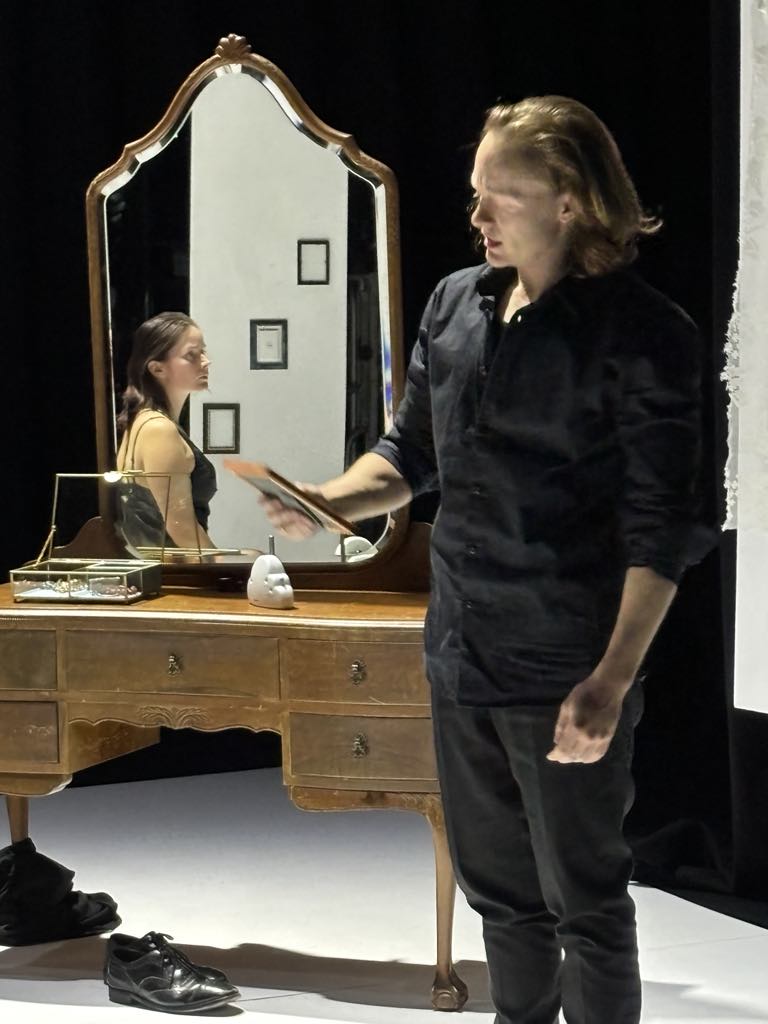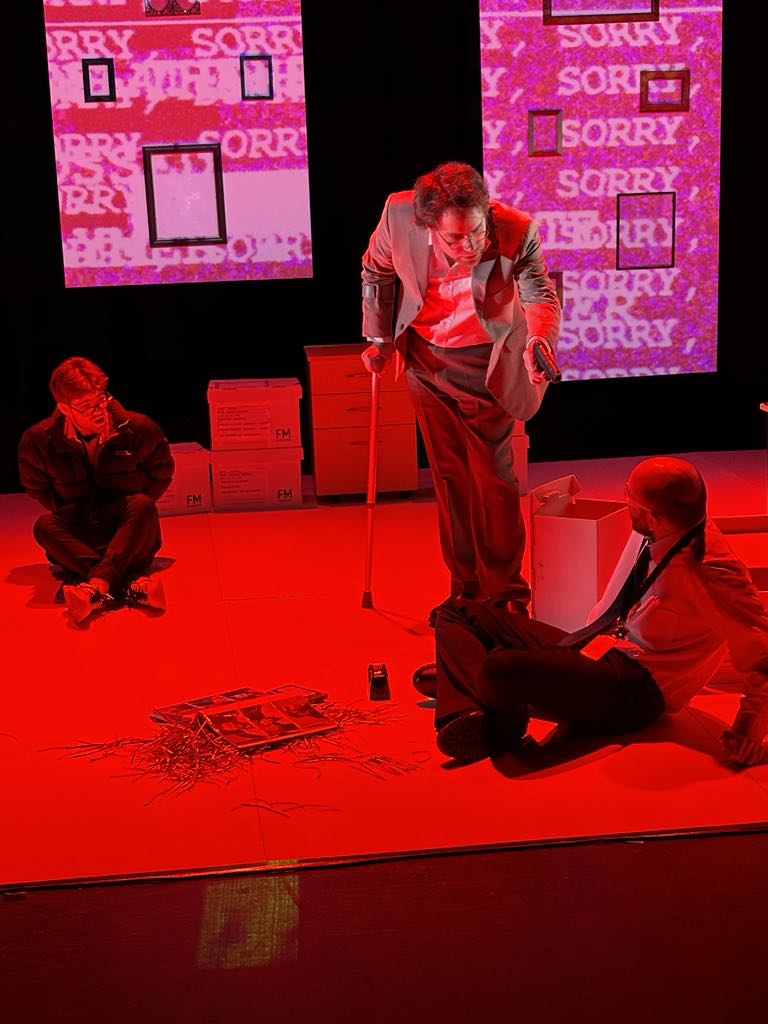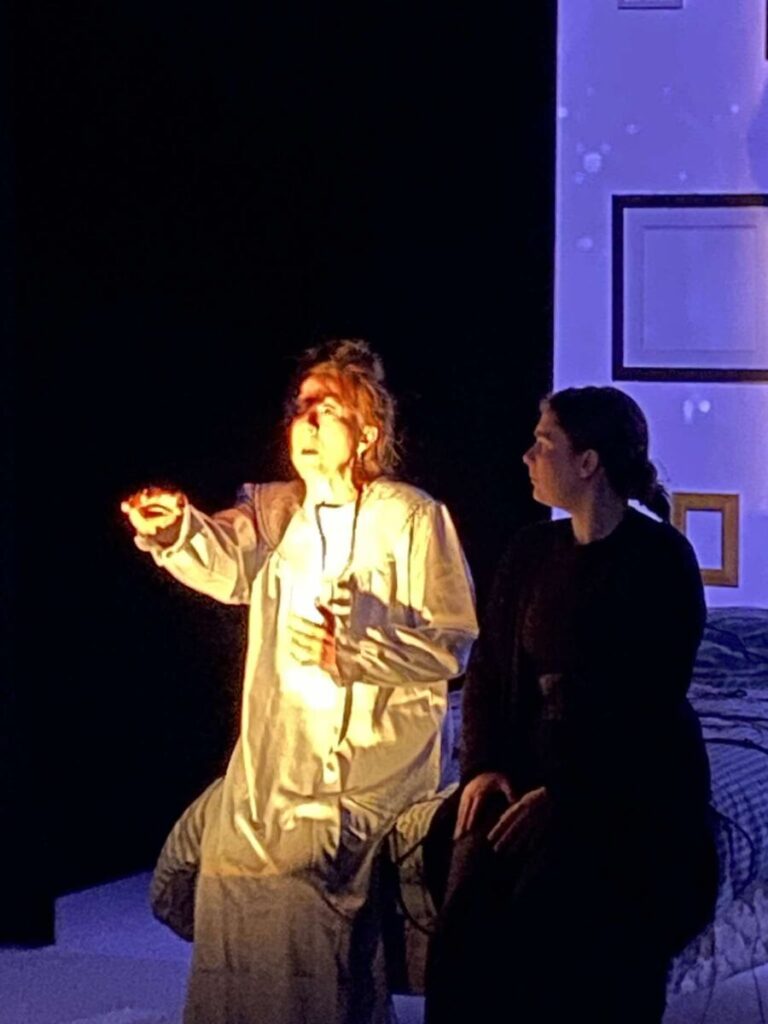New play from local writer cleverly explores memory and loss
Show: On Travelling Backwards to Punish Ourselves as Ghosts
Presented by: One Question Theatre
Where: The Meteor Theatre
When 8-10 August
Tickets: https://themeteor.co.nz/event/on-travelling-backwards-to-punish-ourselves-as-ghosts/
On Travelling Backwards to Punish Ourselves as Ghosts is a play which is rich with language and imagery. It has at its core, a thread of memory which trails across three separate stories, each exploring and examining big ideas about what it is to remember, to be human, and to be remembered.
Written by Liam Hinton, it’s the first original work for One Question Theatre, who presented Closer in 2023 and adapted novella The Longest Drink in Town in 2022.
Each story has its own director and cast and focuses on a central idea. In between, a ‘narrator’ (Jared Woolridge) presents monologues which are rich with figurative language, vivid and clever. Woolridge is a type of ‘everyman’ in jeans and t shirt, but the language drips with complexity and big ideas that are poetic in feel.
The first story is directed by Jack Knowles with Ruby Brett and Liam Hinton playing a couple who have lost a child. The scene is intimate and painful; they haven’t just lost their son, they’ve lost their familiarity, the ease of communication and certainty about each other. The emotionally charged scene lifts and dips with both characters sparring and yielding in turn. Brett and Hinton show both the moments of connection, and of separation well. At times the pace was quite slow and a little quiet, but this reflects their discordance. It was strongest for me when they were in direct dialogue.

The second scene, directed by Liam Hinton, starts in a bland public service office where Disposal (Nick Hall) is busy at his desk, clicking and tapping throughout Woolridge’s monologue. He fusses with folders, adding and removing before gliding on his chair back and forth putting items in the shredder. His colleague Outreach (Jack Knowles) joins him and as they banter, the nature of their work and the dystopian context becomes clearer. It’s a clever construct to contrast bland bureaucracy with the vivid life represented in the folders and Shredder deserves a programme billing of its own as it whirrs and squeaks, blandly, coolly destroying. A new character (Jared Woolridge) enters dramatically and the action ramps up with challenges and human emotions charging to the fore. I don’t want to give too much away about this scene as the surprises are good and I enjoyed the mix of control and chaos. I also liked the black humour. When Outreach says, “complicated people don’t work for the government” Disposal shoots back “I might have a novel in me” and there’s a very funny haiku scene.

After an interval (with a clever projected countdown clock) the third story, directed by Ruby Brett, is a finely nuanced portrayal of the strained relationship between a mother and a daughter. Mum (Tracey Slaughter) is in a rest home, slowly losing her memory, moving between what is known and not, memories within grasp and out of reach. In the background a radio crackles, a tinny tannoy voice with big brother overtones. When Daughter (Georgia Pollock) arrives for a rare visit, Mum’s confusion and mixed memories lead to conversations that reveal memories and past hurts. Pollock is very good as the tightly wound daughter, carrying hurt, protecting herself but still direct about what she wants to say. As mum, and former dancer Slaughter moves with light purpose as the moods and memories drift to the past, and the now. There’s some powerful language here, and flashes of insight “Oh please, I know what I wasn’t!”

The team have worked hard on all the production elements and the staging and music are effective. A simple set with empty picture frames forms the backdrop with set changes made between scenes. The music was evocative throughout the play from eerie almost discordant classical sounds to a slow cover of The Smiths ‘Last Night I Dreamt That Somebody Loved Me’
The entire play features projections from multimedia artist and musician Oliver Stewart who collaborated with the directors of each scene. I found this especially effective in the second story where screeds of computerised text scrolls in the background and punctuates the action with facts, forms and words. The visual aesthetic complements the dystopian construct of the office and their repetitive, distressing work.
Afterwards, I wanted to read the play script to explore the themes and language more as each scene feels like a short story it its own right.
Content warning: Strong language, discussion of death, themes of suicide and mental-illness.




